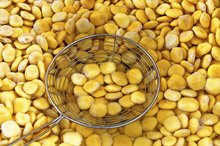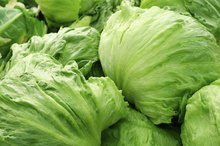What Does Cilantro Do for the Body?
Cilantro has a cultivation history that dates back to at least 1500 B.C., as Sanskrit writings from that time indicate. The herb’s seeds, called coriander, are found inside Egyptian pharaohs’ tombs and in Grecian ruins that date back to the Bronze Age about 5,500 years ago. Vitamin K is cilantro’s major contribution to your health, but the spice also offers small amounts of a few other nutrients.
Nutrition Overview
One-quarter cup of cilantro has 1 calorie and 2 mg of sodium, trace amounts that do not benefit or harm your health. This serving also contains vitamin K in large concentration. The herb provides the trace mineral manganese and vitamins A and B-9, known as folate, each at 1 percent of the recommended daily intake. Vitamins B-1, B-2, B-3, B-5, B-6, C and E are present in amounts too insignificant to benefit your health. Likewise, the concentration of protein, carbohydrates and fatty acids in 1/4 cup of cilantro is minimal.
Vitamin K
What Vitamins & Minerals Do Olives Have?
Learn More
When you spice a dish with 1/4 cup of cilantro, you add 12.4 mcg of vitamin K to it. Your body stores the vitamin K you ingest in fatty tissue for times of need. The nutrient is essential for blood coagulation, keeping you from bleeding to death when you cut yourself. Along with calcium and other nutrients, vitamin K also promotes healthy bones.
Vitamin K Adequate Intake
In 2001, the Food and Nutrition Board of the Institute of Medicine established that adult males need 120 mcg of vitamin K daily and females require 90 mcg. The adequate intake for individuals 18 years old and younger, regardless of gender, ranges from 2 mcg to 75 mcg according to their age. One-quarter cup of cilantro provides around 16 percent of the daily intake of vitamin K for an adult, a number that varies depending on your gender.
Vitamins A and B-9
How to Make a Fenugreek Drink
Learn More
Vitamin A promotes the health of your eyes, skin, teeth, bones and tissues. Vitamin B-9 supports cells in the production of DNA. One-quarter cup of cilantro has 5 percent of the recommended daily intake for vitamin A. The herb offers 1 percent of the suggested intake for B-9.
Manganese
Manganese is a trace mineral, a substance your body needs in small amounts for bone, tissue and blood health. Infertility and neurological disorders are linked to manganese deficiency. One-quarter cup of cilantro provides 1 percent of the daily requirement for this mineral.
Using Cilantro
Cilantro is a fragrant herb related to carrots. The whole plant is edible, including its seeds. Add the fresh leaves to salsa and salads, or put them in a pot of soup toward the end of the cooking so they do not disintegrate. You may also like the citrusy cilantro flavor in your fruit salad. The seeds are available whole or ground, and they make a tasty meat rub. Do not eat cilantro seeds sold for planting, as they may have been treated with pesticides.
Related Articles
References
Writer Bio
Emma Watkins writes on finance, fitness and gardening. Her articles and essays have appeared in "Writer's Digest," "The Writer," "From House to Home," "Big Apple Parent" and other online and print venues. Watkins holds a Master of Arts in psychology.









